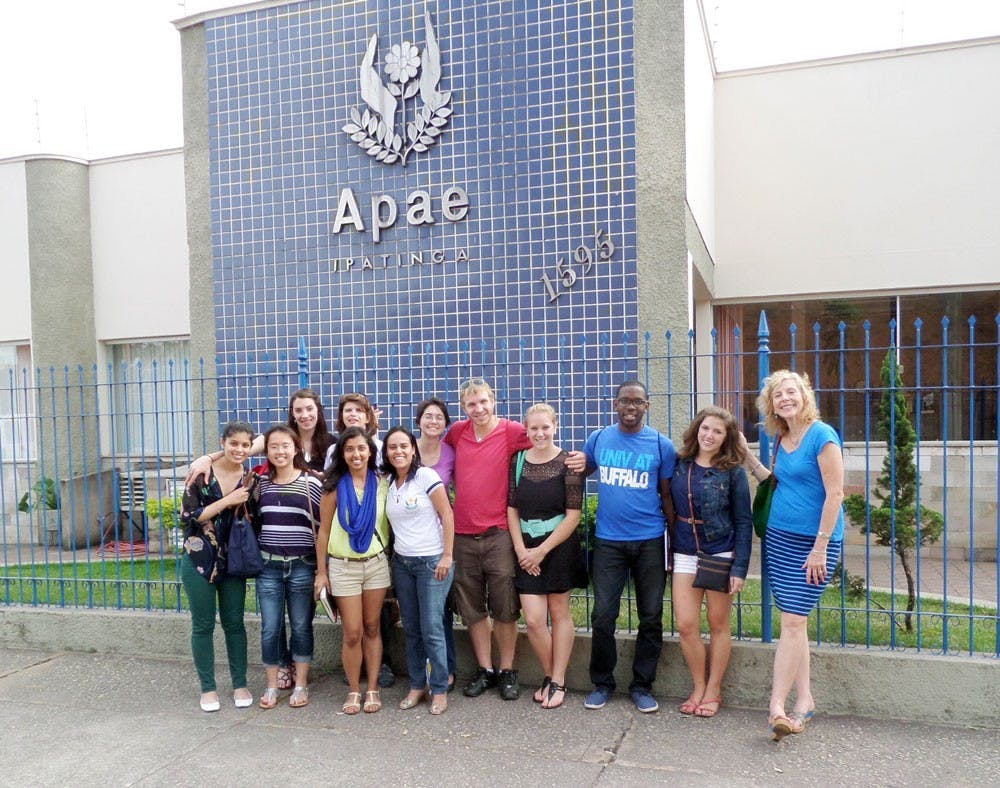After her first semester at UB, Corrine Cardinale wanted to find herself. Cardinale, a sophomore communication and history major, knew the best way to do that was to simply “get lost.”
Cardinale traveled to Berlin, Germany to study foreign reporting this past January. Cardinale, along with an increasing number of UB students wanting to explore new places, left Buffalo through UB’s Study Abroad program. UB Study Abroad gives students the opportunity to learn outside the bounds of a typical classroom setting by traveling the world and learning about new cultures, all while getting class credits. Last year, about 500 UB students traveled through UB or other SUNY schools’ abroad programs.
“I’ve always been told that sometimes in order to find yourself, you need to be lost,” Cardinale said. “And believe me, I got lost a lot in Berlin.”
UB currently has over 70 study abroad and exchange programs, according to Olga Crombie, assistant director for UB Study Abroad. Students can travel to roughly 30 different countries, including Australia, Turkey, and France.
Crombie said UB Study Abroad program stands out because most of UB’s programs are exchange programs.
“We are sensitive to the fact that study abroad can be expensive and try to keep costs down as much as possible so that as many students as possible can pursue a study abroad program,” Crombie said in an email.
Exchange programs mean students do not pay tuition to the overseas university, but pay UB tuition regardless of what it might cost to attend a university in another country, said Crombie.
Crombie also said in some cases, tuition may be greater at certain overseas universities. Exchange programs through the UB Study Abroad office eliminate having to pay what SUNY refers to as a “tuition differential,” meaning students would have to pay additional costs rather than just the regular price of tuition for a typical semester at UB.
Even with the hands-on life experiences students can gain through studying abroad, Crombie said students may still be apprehensive about traveling during college, especially when thinking about costs or course selection.
She said these two issues may be easily solved: students just need to plan everything out first.
Natasha Singh, a senior biomedical science and psychology major, said she always had an inclination to travel and learn about different cultures. Singh said this largely was because she was born in the United States, but is of Indian descent.
After her freshman year, Singh sought after the opportunity to travel to Brazil through UB’s Health in Brazil program. Singh said she became increasingly aware of the numerous “medical treatment inequalities for people below average socioeconomic status” through volunteering for UB’s Honor College.
“As an aspiring healthcare physician, I wanted to learn about the current healthcare policies in other countries so that I can one day be a part of a positive, systemic change to our own health care system in the United States,” Singh said.
Singh found that through the study abroad program, she was able to travel to different parts of Brazil, including Rio de Janeiro and Barbacena, and partake in hands-on learning at clinics, hospitals and rehabilitation centers.
But UB students also aren’t limited to studying through UB’s program.
Students may participate through other SUNY study abroad programs, which offer over 600 programs in about 50 different countries, Crombie said.
Jessica Miranda, a sophomore criminology major at SUNY Cortland, studied abroad at Florence University of the Arts in Florence Italy this past spring semester. Miranda said when she first heard of studying abroad when she was in middle school, she knew it was something she planned on doing in college.
“I just knew somehow, some way, I would study abroad,” Miranda said. “I want to see the world.”
Miranda went to Italy through SUNY Stony Brook’s study abroad program. The only difference when studying in a SUNY program outside of one’s own school was that there were two applications she needed to fill out, however both were online and “really simple,” Miranda said.
Cardinale, Singh and Miranda all said that studying abroad changed their outlooks on life.
Learning to be kind and respect other people and their values was one of the greatest things Cardinale took away from studying abroad, she said. Singh said her time in Brazil expanded the way she looks at things and she encourages students going into college to keep studying abroad in mind.
“The knowledge that you gain from embarking on a study abroad program can never be found in an academic class or within a textbook,” Singh said. “It is important to supplement our education with these vital experiences so that we can fundamentally grow, not only as scholars, but also as human beings.”
Marlee Tuskes is the asst. news editor and can be reached at marlee.tuskes@ubspectrum.com





